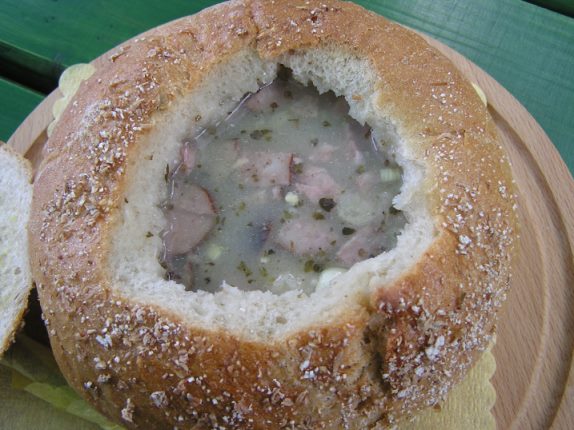Something about borscht

Don’t call it “beetroot soup”; you are likely to cause an international incident. It’s best to stay away from casual statements about its origins too. There is a certain national pride over the stuff, across Russia, Ukraine, Poland, Belarus, Lithuania, Romania and indeed several other countries around central and Eastern Europe. It even crossed over into Germany and China, where in the latter it’s referred to as “Ruoson Soup”, and yes, if you are wondering: that is a Chinglish corruption of “Russian Soup”.
Through the immigration of Eastern European Jews since colonial times, borshct has also reached the USA, Britain and more – though in this respect it’s naturally more prevalent where Jewish communities are largest. It certainly hasn’t crossed the invisible ‘culture barrier’ into the UK mainstream, in the same way that Chinese and Indian food has. Perhaps our ‘veg soup’ niche was already filled by various stocks, soups, broths and other pot-boilers, whereas food from other cultures seemed so radically different and therefore more enticing?
But, with regard to origins: there can be only one, right? Well, Ukraine seems to be the main contender, not forgetting that Kievan Rus (centered politically on Kiev, modern Ukraine’s captial) was the medieval East-Slavic state that would become cultural ancestor to Ukraine, Belarus and Russia. The region at its greatest extent stretched from the Black Sea to the Baltic, from the (now Polish) river Vistula to the Taman Peninsula. When it comes to assigning origins; modern geographical names and boundaries mean a good deal less than we may at first think. ‘Best not push the issue though.
In any case borsch, borsh, bortsch, borshch, borstch, boršč – and other permutations – is essentially (and I’m treading carefully here) a soup of Beetroot and other vegetables with added stock for more flavour. Those ‘other vegetables’ would likely include cabbage and potato, but that really is as far as the generalisation may go. Yes, the stock is usually meat-based, as is common throughout Eastern Europe – but there were Slavic vegetarian sub-classes (usually relegated to servitude) and there are still meat-free variations on the basic formula. It’s also worth remembering that in impoverished medieval families there was often an enforced semi-vegetarianism at the dinner table, with the inclusion of meat being literally ‘pot luck’ – or at least reserved for special occasions.
All in all, borscht can be pretty diverse when spread across many countries and cultures. Perhaps in trying to contain it in a single definition, the point is being missed. The ‘point’ is that it is a flexible, varied base relationship of ingredients that can be moulded to fit a wide range of tastes and cultures.
So the preparation of a borscht dish may go something like this:-
- Slabs of meat are boiled in 1-3 litres of water (depending on the number being served) to prepare the stock. A little salt may be added to enhance the flavour. This may take an hour or so, though the sacreligeous may resort to prepared stock or cubes! A travesty that I may well embrace when I come to make mine.
- The beets are also boiled, even with the leaves. That’s something us Brits just ‘don’t do’, but let’s try to live and learn. Once diced they are then fried in butter for around 15 minutes along with ‘supporting’ vegetables to enhance the taste. This may include seasonal vegatables, carrots, leeks, whatever. Stock is also added when dryness prevails.
- Then it’s time for the ‘big guns’: cabbage, more (grated) beetroot, more stock and soft, diced potatoes. Perhaps more flavouring too: garlic for instance that would not have survived the big fry.
- The whole mixture is then steeped until “done” and served (typically) with sour cream.
I balk (and probably retch) at the meat and dairy, but I will try something like this, just to see what happens. Variations (and more finesse) abound. Check the web (or a ‘world’ cookbook) for more comprehensive instructions. Enjoy.
[Photo by mzacha]

